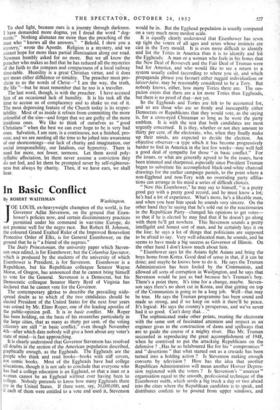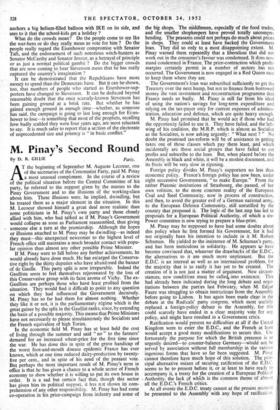In Basic Conflict J OE LOUIS, ex-heavyweight champion of the world,
is for Governor Adlai Stevenson, on the ground that Eisen- hower's, policies now, and certain discriminatory practices permitted under his command in war-time Europe, do not promise well for the negro race. But Robert H. Johnson, the coloured Grand Exalted Ruler of the Improved Benevolent Protective Order of Elks, is for General Eisenhower, on the ground that he is'" a friend of the negroes." ' The Daily Princetonian, the university paper which Steven- son once edited, is for Eisenhower; but the Columbia Spectator, which is produced by the students of the university of which Eisenhower is President, is for Stevenson. Eisenhower is a Republican, but his Republican colleague Senator Wayne Morse, of Oregon, has announced that he cannot bring himself to vote for the General. Stevenson is a Democrat, but his Democratic colleague Senator Harry Byrd of Virginia has declared that he cannot vote for the Governor.
The' contemporary phrase to describe the prevailing wide- spread doubt as to which of the two candidates should be elected President of the United States for the next four years was coined by Mr. Elmo Roper, one of the leading apostles of the public-opinion poll. It is in basic conflict. Mr. Roper has been holding, on the basis of his researches particularly in the large cities, that as many as thirty per cent. of the voting citizenry are still " in basic conflict," even though November 4th—after which date nobody will give a hoot about any voter's state of mind—is fast approaching. It is clearly understood that Governor Stevenson-has resolved all doubts in the section of the American population described, graphically enough, as the Eggheads. The Eggheads are the people who think and read books—books with stiff covers, not comic books. Most of the Eggheads have had college educations, though it is not safe to conclude that everyone who has had a college education is an Egghead, or that a man or a woman cannot be an Egghead without ever having been to college. Nobody pretends to know how many Eggheads there are in the United States. If there were, say, 30,000,000, and if each of them were entitled to a vote and used it, Stevenson would be in. But the Egghead population is usually computed on a very much more modest scale.
It is equally clearly understood that Eisenhower has sewn up tight the voters of all ages and sexes whose instincts are cast in the Tory mould. It is even more difficult to identify and list the Tories in America than it is to identify and list the Eggheads. A man or a woman who feels in his bones that the New Deal of Roosevelt and the Fair Deal of Truman were bad for America, and who would like to see a return to a system usually called (according to where you sit, and which propaganda phrase you favour) either rugged individualism or laisser-faire, may be reasonably considered to be a Tory. But nobody knows, either,' how many Tories there are. The sus- picion exists that there are a lot more Tories than Eggheads, but there is no proof of that—not yet. So the Eggheads and Tories are felt to be accounted for, and so are those who are so firmly and inescapably either Democrats or Republicans that they would vote, as the saying is, for a cross-eyed Chinaman so long as he wore the party emblem. It is with the rest that both candidates are most urgently concerned. It is they, whether or not they amount to thirty per cent. of the electorate, who, when they finally make up their minds, are expected to decide the election. An objective observer—a type which it has become progressively harder to find in America in the last few weeks—may well feel a good deal of sympathy for those " in basic conflict." For the issues, or what are generally agreed to be the issues, have been trimmed and sharpened, especially since Presitlent Truman began to substitute his accomplished black-and-white charcoal drawings for the earlier campaign pastels, to the point where a non-Egghead and non-Tory with no overriding party affilia- tions can arrange in his mind a series of difficult choices.
" Now this Eisenhower," he may say to himself, " is a pretty good guy with a pretty good record, and he must know a lot; he's had a lot of experience. What's more, he's a likeable man, and when you hear him speak he sounds very sincere. On the other hand they're saying that he's sold out to the reactionaries in the Republican Party—changed his opinions to get votes— so that if he is elected he may find that if he doesn't go along with them he'll get nowhere. This Stevenson sounds a pretty intelligliif and honest sort of man, and he certainly lays it on the line; he says a lot of things that politicians are supposed to be afraid to say. Very well educated man, he sounds, and he seems to have made a big success as Governor of Illinois. On the other hand I don't know much about him.
" Eisenhower says let the Asians fight Asians and bring the boys home from Korea. Good deal of sense in that, if it can be done; and maybe he knows how to do it. He says the Truman Administration has been fooled by the Communists, and allowed all sorts of corruption in Washington, and he says that Stevenson would be just as bad because -he's Truman's boy.
There's a point there. It's time for a change, maybe. Steven- son says there's no short cut in Korea, and that getting on top of the Communists is going to be a long job. Well—that may be true. He says the Truman programme has been sound and made us strong, and if we keep on with it there'll be peace. It's logical.- He says the country's prosperous, and we've never had it so good. Can't deny that. . ." The sophisticated make other points, treating the electorate with the same sort of fascinated attention and respect as an' engineer gives to the construction of dams and spillways that are to guide the course of a mighty river. Has Mr. Truman succeeded in reproducing the great accomplishment of 1948. when he contrived to put the attacking Republicans on the defenSive ? ..Has he so belaboured Ike for his " compromises " and " desertions " that what started out as a crusade has been turned into a holding action ? Is Stevenson making enough converts by television ? How has the idea that another Republican Administration will mean another Hoover Depres- sion registered with the voters ? Is Stevenson's " amateur " organisation equal to the smooth, professional technique of the Eisenhower outfit, which sends a big truck a day or two ahead into the cities where the Republican candidate is to speak, and distributes confetti to be poured from upper windows, and anchors a big helium-filled balloon with IKE on its side, and sees to it that the school-kids get a holiday ?
What do the crowds mean? Do the people come to see Ike the war-hero or do they really mean to vote for him ? Do the people really regard the Eisenhower compromise with Senator Taft, and the endorsement of such notorious witch-hunters as Senator McCarthy and Senator Jenner, as a betrayal of principle or as just a normal political gambit ? Do the bigger crowds that are now coming to hear Stevenson mean that he has really captured the country's imagination ? It can be demonstrated that the Republicans have more money to spend than the Democrats have. - But it can be-shown, too, that numbers of people who started as Eisenhower-sup- porters have changed to Stevenson. It can be deduced beyond reasonable doubt that the once scarcely-known Stevenson has been gaining ground at a brisk rate. But whether he has gained enough ground in enough time—whether, as someone has said, the campaign is going to last long enough for Eisen- hower to lose—is something that most of the prophets, recalling how badly scalded they were four years ago, are most reluctant to say. It is much safer to report that a section of the electorate of unprecedented size and potency is " in basic conflict."



































 Previous page
Previous page